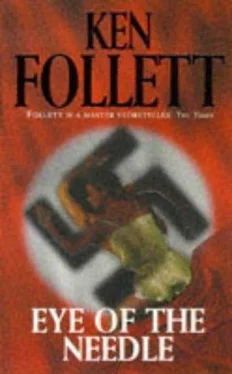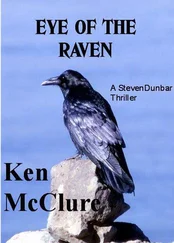Tom. She had to go to Tom. He would know what to do; he would protect her and Jo until the police came; he had a dog and a gun.
Her fear was interrupted by a dart of sadness, of sorrow for the Henry she had believed in, had almost loved; clearly he did not exist-she had imagined him. Instead of a warm, strong, affectionate man, she saw in front of her a monster who sat and smiled and calmly gave her invented messages from the husband he had murdered.
She forced herself not to shudder. Taking Jo's hand, she walked out of the kitchen, along the hall and out of the front door. She got into the jeep, sat Jo beside her, and started the engine.
But Henry was there, resting his foot casually on the running board, and holding David's shotgun. "Where are you going?
If she drove away now he might shoot- hat instinct had warned him to take the gun into the house this time?-and while she herself might chance it, she couldn't endanger Jo. She said, "Just putting the jeep away."
"You need Jo's help for that?"
"He likes the ride. Don't cross-examine me!"
He shrugged and stepped back.
She looked at him for a moment, wearing David's hacking jacket and holding David's gun so casually, and wondered whether he really would shoot her if she simply drove away. And then she recalled the vein of ice she had sensed in him right from the start, and knew that that ultimate commitment, that ruthlessness, would allow him to do anything.
With an awful feeling of weariness, she threw the jeep into reverse and backed into the barn. She switched off, got out, and walked with Jo back into the cottage. She had no idea what she would say to Henry, what she would do in his presence, how she would hide her knowledge if, indeed, she had not already betrayed it. She had no plans. But she had left the barn door open.
"That's the place, Number One," the captain said, and lowered his telescope. The first mate peered out through the rain and the spray. "Not quite the ideal holiday resort, what, sir? Jolly stark, I should say."
"Indeed." The captain was an old-fashioned naval officer with a grizzled beard who had been at sea during the first war with Germany. However, he had learned to overlook his first mate's foppish conversational style, for the boy had turned out against all expectations to be a perfectly good sailor.
The "boy" who was past thirty and an old salt by this war's standards, had no idea of the magnanimity he benefitted from. He held on to a rail and braced himself as the corvette mounted the steep side of a wave, righted itself at the crest and dived into the trough. "Now that we're here, sir, what do we do?"
"Circle the island."
"Very good, sir."
"And keep our eyes open for a U-boat."
"We're not likely to get one anywhere near the surface in this weather and if we did, we couldn't see it unless it came within spitting distance."
"The storm will blow itself out tonight-tomorrow at the latest." The captain began stuffing tobacco into a pipe.
"Do you think so?"
"I'm sure."
"Nautical instinct, I suppose?"
"The weather forecast."
The corvette rounded a headland, and they saw a small bay with a jetty.
Above it, on the cliff top, was a little cottage standing small and square, hunched against the wind.
The captain pointed. "We'll land a party there as soon as we can."
The first mate nodded. "All the same…"
"Well?"
"Each circuit of the island will take us about an hour, I should say."
"So?"
"So, unless we're jolly lucky and happen to be in exactly the right place at exactly the right time…"
"The U-boat will surface, take on its passenger, and submerge again without us even seeing the ripples," the captain finished. "
Yes."
The captain lit his pipe with an expertise that spoke of long experience in lighting pipes in heavy seas. He puffed a few times, then inhaled a lungful of smoke "Ours not to reason why," he said, and blew smoke through his nostrils.
"A rather unfortunate quotation, sir."
"Why?"
"It refers to the notorious charge of the Light Brigade."
"I never knew that." The captain puffed away. "One advantage of being uneducated, I suppose."
There was another small cottage at the eastern end of the island. The captain scrutinised it through his telescope and observed that it had a large, professional-looking radio aerial. "Sparks!" he called. "See if you can raise that cottage. Try the Royal Observer Corps frequency."
When the cottage had passed out of sight, the radio operator called: "No response, sir."
"All right, Sparks," the captain said. "It wasn't important."
The crew of the coastguard cutter sat below decks in Aberdeen Harbour playing blackjack for halfpennies and musing on the feeblemindedness that seemed invariably to accompany high rank.
"Twist," said Jack Smith, who was more Scots than his name. Albert "Slim" Parish, a fat Londoner far from home, dealt him a jack. "Bust." Smith said.
Slim raked in his stake. "A penny-ha'penny," he said in mock wonder "I only hope I live to spend it."
Smith rubbed condensation off the inside of a porthole and peered out at the boats bobbing up and down in the harbour. "The way the skipper's panicking. you'd think we were going to bloody Berlin, not Storm Island."
"Didn't you know? We're the spearhead of the Allied invasion." Slim turned over a ten, dealt himself a king and said, "Pay twenty-ones."
Smith said. "What is this guy, anyway, a deserter? If you ask me, it's a job for the military police, not us."
Slim shuffled the pack. "I'll tell you what he is-an escaped prisoner of war."
Jeers.
"All right, don't listen to me. But when we pick him up, just take note of his accent." He put the cards down. "Listen, what boats go to Storm Island?"
"Only the grocer," someone said.
"So the only way he can get back to the mainland is on the grocer's boat. The military police just have to wait for Charlie's regular trip to the island, and pick him up when he steps off the boat at this end. There's no reason for us to be sitting here, waiting to weigh anchor and shoot over there at the speed of light the minute the weather clears, unless…" He paused melodramatically. "Unless he's got some other means of getting off the island."
"Like what?"
"A U-boat, that's what."
"Bollocks," Smith said. The others merely laughed.
Slim dealt another hand. Smith won this time, but everyone else lost. "I'm a shilling up," Slim said. "I think I'll retire to that nice little cottage in Devon. We won't catch him, of course."
"The deserter?"
"The prisoner of war."
"Why not?"
Slim tapped his head. "Use your noddle. When the storm clears we'll be here and the U-boat will be at the bottom of the bay at the island. So who'll get there first? The Jerries."
"So why are we doing it?" Smith said.
"Because the people who are giving the orders are not as sharp as yours truly, Albert Parish. You may laugh!" He dealt another hand. "Place your bets. You'll see I'm right. What's that, Smithie, a penny? Gorblimey, don't go mad. I tell you what, I'll give odds of five to one we come back from Storm Island empty-handed. Any takers? Ten to one? Eh? Ten to one?"
"No takers," said Smith. "Deal the cards."
Slim dealt the cards.
Squadron-Leader Peterkin Blenkinsop (he had tried to shorten Peterkin to Peter but somehow the men always found out) stood ramrod-straight in front of the map and addressed the room. "We fly in formations of three," he began.
"The first three will take off as soon as weather permits. Our target," he touched the map with a pointer "is here. Storm Island. On arrival we will circle for twenty minutes at low altitudes, looking for a U-boat.
"After twenty minutes we return to base." He paused. "Those of you with a logical turn of mind will by now have deduced that, to achieve continuous cover, the second formation of three aircraft must take off precisely twenty minutes after the first, and so on. Any questions?"
Читать дальше












